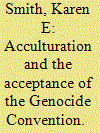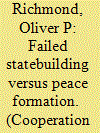|
|
|
Sort Order |
|
|
|
Items / Page
|
|
|
|
|
|
|
| Srl | Item |
| 1 |
ID:
123261


|
|
|
|
|
| Publication |
2013.
|
| Summary/Abstract |
This article contributes to the burgeoning literature on why states ratify human rights treaties. It first analyses why Ireland, the United Kingdom and the United States did not initially ratify or accede to the 1948 Genocide Convention, and then explores why the three countries eventually did accept it, 20-40 years after it was approved by the United Nations General Assembly. The extent to which material costs and benefits, the logic of appropriateness, and acculturation played a role in each of the three cases is assessed. Acculturation is particularly evident in the Irish case, but it also helps to explain the UK and US acceptance of the Convention.
|
|
|
|
|
|
|
|
|
|
|
|
|
|
|
|
| 2 |
ID:
123263


|
|
|
|
|
| Publication |
2013.
|
| Summary/Abstract |
This analysis examines the link between 'indirect rivalry factors' - situations in which states are neighbors of direct US rivals, and/or states that share rivalries in common with the US - and allocations of foreign aid to shed light on the impact of strategic calculations on a key area of foreign policy behavior. Blending literatures on rivalry/conflict and foreign aid, the study is situated in the relevant prior work and a theory is developed that links indirect rivalry factors with allocations of foreign aid. It is argued that indirect rivalry factors are likely to affect a state's foreign assistance as states in a rivalry strategically allocate aid to create friends and isolate their targeted rivals. In particular, it is argued that donors direct greater amounts of aid to (i) other states involved in a rivalry with the donor's rivals (rivalries in common, or 'rivals of my rival' effects) and (ii) states within the geographic region in which the donor's existing rivals are situated (neighborhood effects, or 'neighbors of rivals'). Hypotheses on the effects of these indirect rivalry factors on aid allocations are developed and then tested empirically against US foreign aid allocations from 1962 to 2000. The results lend support to the authors' theory of indirect rivalry factors and their impact on aid allocation.
|
|
|
|
|
|
|
|
|
|
|
|
|
|
|
|
| 3 |
ID:
123262


|
|
|
|
|
| Publication |
2013.
|
| Summary/Abstract |
This article outlines the often countervailing forces and norms of state formation, statebuilding and peacebuilding according to their associated theoretical approaches. It introduces a new concept of 'peace formation', which counterbalances a reliance on internal violent or externalised institutions' agency, reform and conditionality. Without incorporating a better understanding of the multiple and often critical agencies involved in peace formation, the states emerging from statebuilding will remain as they are: failed by design. This is because they are founded on externalised systems, legitimacy and norms rather than a contextual, critical and emancipatory epistemology of peace. Engaging with the processes of peace formation may aid international actors in gaining a better understanding of the roots of a conflict, how local actors may be assisted, how violence and power-seeking may be ended or managed and how local legitimacy may emerge.
|
|
|
|
|
|
|
|
|
|
|
|
|
|
|
|
| 4 |
ID:
123260


|
|
|
|
|
| Publication |
2013.
|
| Summary/Abstract |
This article argues that the Responsibility to Protect (RtoP) adds value to international efforts to protect populations from genocide and mass atrocities, but not in the ways commonly thought. It suggests that RtoP is not particularly effective as a 'rallying call' that mobilises action in cases where international society may be initially reluctant to act. Where it does add value is in helping to reshape states' identities and interests such that consideration of the protection needs of populations, in relation to the threat of genocide and mass atrocities, has been internalised to some extent by the UN Security Council. As such, RtoP is best seen as being a 'habit former'. The principle does not, however, determine particular behaviours or guarantee international consensus because decision-making is heavily influenced by contextual factors. The argument proceeds in three parts. The first examines instances where RtoP has been invoked since early 2006. The second explores the role of context in shaping how the UN Security Council responds to particular crises. Finally, to amplify the points made in these sections, the third section considers the UN Security Council's response to the crisis in Somalia after 2006.
|
|
|
|
|
|
|
|
|
|
|
|
|
|
|
|
| 5 |
ID:
123264


|
|
|
|
|
| Publication |
2013.
|
| Summary/Abstract |
This article examines how cognitive and normative ideas influence the ability of the European Union (EU) to formulate common policies in response to international crises such as the 2002-2003 Iraq crisis and the Iranian nuclear crisis (since 2002). It argues that in crisis situations, i.e. in highly uncertain circumstances, ideas often become the principal guide for policy-makers. More specifically, ideas foster interpretations of a crisis along several core themes: above all, how the crisis issue is perceived, which means are deemed to be legitimate and/or effective and, depending on the particular crisis, how other relevant themes are seen, e.g. the appropriate relationship with the United States. Thus, the formulation of common EU crisis response depends on the convergence of these interpretations in Member States - as in the Iran crisis. On the contrary, if Member States' interpretations diverge beyond a common 'ideational space' - as in the case of Iraq - dissonance will be the probable outcome.
|
|
|
|
|
|
|
|
|
|
|
|
|
|
|
|
|
|
|
|
|